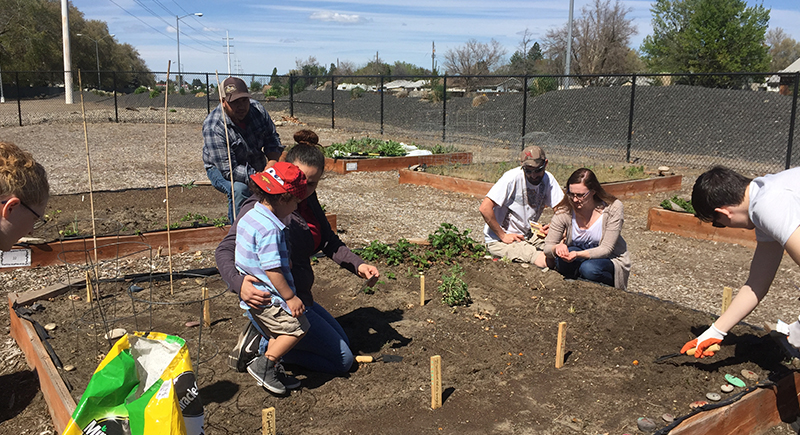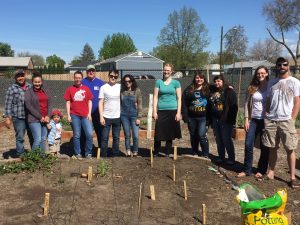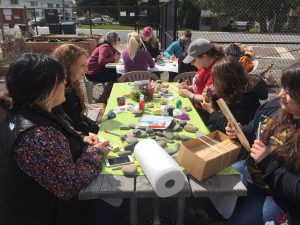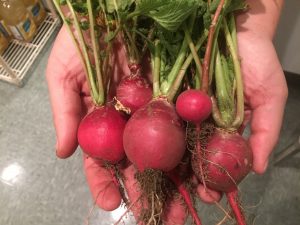
June 22, 2018 Education course using community garden, partnership practices to connect learning to real world
By Maegan Murray
RICHLAND, Wash. – Education students at Washington State University Tri-Cities had the chance to put what they learned about school-community engagement practices to use with a new community garden experience that also educates community members about gardening, healthy eating habits and more.

WSU Tri-Cities education students, their families and community members pose for a photo in the Richland Community Garden after hosting a planting day.
This spring, WSU Tri-Cities faculty and staff joined together to start a community garden as part of the new Personal Food Security and Wellness project on campus. The program aims to deepen the understanding of food insecurity among college students, staff and faculty, and mobilize efforts to ensure the campus community is food secure.
WSU Tri-Cities education professor Sarah Newcomer and her students, all of whom are pre-service teachers, partnered with Debbie Conner, director of campus health and wellness, Jordyn Creighton, student financial and support services manager, and librarian Cheryl Farabee for the campus-community garden project. The group hosted a community planting event with Tri-Cities students and their families at the community garden in Richland and recently harvested their first produce from the garden.
The goal of the project, Newcomer said, is to provide the pre-service teachers an opportunity to apply what they had learned about engaging with families and communities in the academic setting while also integrating culturally-responsive teaching practices into the community garden activity.
Throughout the initial two gardening days, the WSU Tri-Cities students and families planted a variety of produce, in addition to painting rocks to help decorate the garden and creating multicultural signs to mark the various plants. The education students were responsible for organizing the event and worked with the families that attended to implement what they had learned about school to community engagement practices.
“Building relationships with students and their families should be at the heart of effective teaching,” Newcomer said. “It was really nice to see my students and their families working together out at the garden. At the end of each planting day, everyone put their hand-painted rocks out in the garden and it was nice to see all of the different designs and ideas on the rock art. It is very nice to have the garden be a multilingual space.”
Connecting lessons to shared experiences
Newcomer’s course focuses on how to teach reading and writing in grades fourth through eighth, however, the pre-service teachers are also taught about

WSU Tri-Cities education students work with community members to paint rocks that are now featured in the Richland Community Garden during a planting day this spring.
the importance of relating the students’ linguistic and cultural backgrounds to everyday instruction. With the planting day, the pre-service teachers learned how to plan and carry out an event that welcomes families.
“This class made me realize that there is so much more than just bringing a book from a different culture in implementing those cultural components into the students’ learning,” student Olga Sandoval said. “It’s about identifying what a kid has and can bring to the table and bridging those cultural areas to make learning their own. Families are a big part of that. By bringing parents into the school setting, the students and their families establish that important relationship and everyone benefits.”
The WSU Tri-Cities students said by building classroom lessons around concepts that are familiar to the child’s upbringing, the child is able to understand the educational material better and become more engaged with the lesson. With the community garden activity, some of the family members involved had experience with agriculture and became community experts during the event.
Newcomer said it allowed the pre-service teachers to partner with their students’ families while they learned more about their students’ “funds of knowledge,” or the abundant knowledge, skills and cultural resources for learning that students have access to at home.
“There are a lot of families that work in agriculture around here since it is one of the area’s prominent industries,” junior Jackie Degroot said as an example. “Many families can connect to the subject of agriculture and we can use the subject as a bridge to academic learning.”
Giving back and forward
The produce grown from the community garden will be donated to the WSU Tri-Cities Cougar Cupboard, the campus’ food pantry for students and their families.

WSU Tri-Cities education students recently harvest some of their first produce from their plots at the Richland Community Garden, including the radishes pictured.
In addition to the benefits of the learning component, Farabee said she hopes the project will inspire community members to consider growing their own produce.
“I want the people who benefit from the food grown in the garden to realize fresh foods can be grown in this area,” she said. “I hope people see how possible gardening really is.”
Current and future education courses will continue to host planting and harvesting days for the garden as a means to practice school-family engagement projects and for integrating culturally-responsive teaching practices.
“The garden presents a unique opportunity to not only educate our local community about gardening practices and healthy eating,” Newcomer said. “It also presents a terrific opportunity for our education students to practice what they’ve learned about educating their own students with culturally-relatable lessons and through events that welcome the whole family into their learning.”





